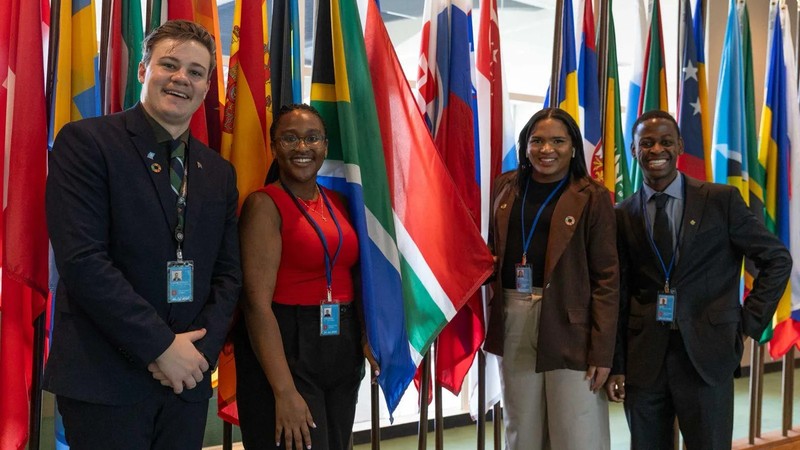UCT students make history at the UN High-Level Political Forum on Sustainable Development
In a groundbreaking moment for youth representation in South African diplomacy, four University of Cape Town (UCT) students made history by representing their nation at the 2025 United Nations High-Level Political Forum on Sustainable Development (HLPF). Taking place from 14-24 July at the UN Headquarters in New York, this significant event showcased the voices of youth as part of South Africa’s official delegation—an unprecedented development in recent years.
Suitably equipped with passion and a commitment to social responsiveness, the UCT delegation comprised Nico Pampier, Seabelo Mnisi, Zou Rwexwana, and Ben Gukelberger. The students participated through the United Nations Association of South Africa – UCT Chapter (UNASA-UCT), contributing to discussions centered on advancing science- and evidence-based solutions for the 2030 Agenda and its Sustainable Development Goals (SDGs).
This year’s forum reviewed five pivotal SDGs:
- SDG 3: Good health and well-being
- SDG 5: Gender equality
- SDG 8: Decent work and economic growth
- SDG 14: Life below water
- SDG 17: Partnerships for the goals
The HLPF serves as a vital platform bringing together global policymakers, academics, ministers, and civil society to assess collective progress towards achieving these ambitious goals. This inclusion of young voices reflects a growing recognition of the importance of youth engagement in addressing global challenges.
Mnisi, serving as the SDG education director, remarked on the transformative nature of the experience. “The exposure to multilateral dialogue and international policymaking was profound,” he noted. “Witnessing how different countries tackle development hurdles with innovative strategies has sharpened my understanding of how we can adapt such frameworks to serve South Africa’s development goals.”
Gukelberger, who took on the role of outreach director, emphasised the responsibility they bore in amplifying the voices of youth from the Global South. “The most important part of my being at this forum was to echo the voices of students and youth that we work with now and in the future, at every event and interaction,” he expressed.
Pampier, the executive chair, highlighted an urgent call to action for African countries. “Agenda 2030 and Agenda 2063 are roadmaps for African countries to see young people as catalysts for change. We cannot let this be just a stocktaking experience; we must learn from both positives and challenges and take bold actions upon our return.”
The forum witnessed the participation of over 250 young delegates from across the globe, indicating a promising trend towards inclusivity in international development conversations.
Spearheaded by UCT’s Department of Student Affairs’ “Student Travel Fund,” which supported the travel costs for three of the four delegates, this initiative aims to break down barriers that South African youth face in accessing international platforms.
Upon their return, the UCT delegation has plans to translate their experiences into tangible impacts through student-led outreach, policy engagement, and awareness campaigns. They remain steadfast in their belief that universities play a crucial role in enhancing national development through research and evidence-based solutions.
Their pioneering involvement not only sets a new precedent for youth participation in South Africa’s foreign engagements but also reinforces UCT’s dedication to shaping graduates who are prepared to lead in addressing global challenges.

